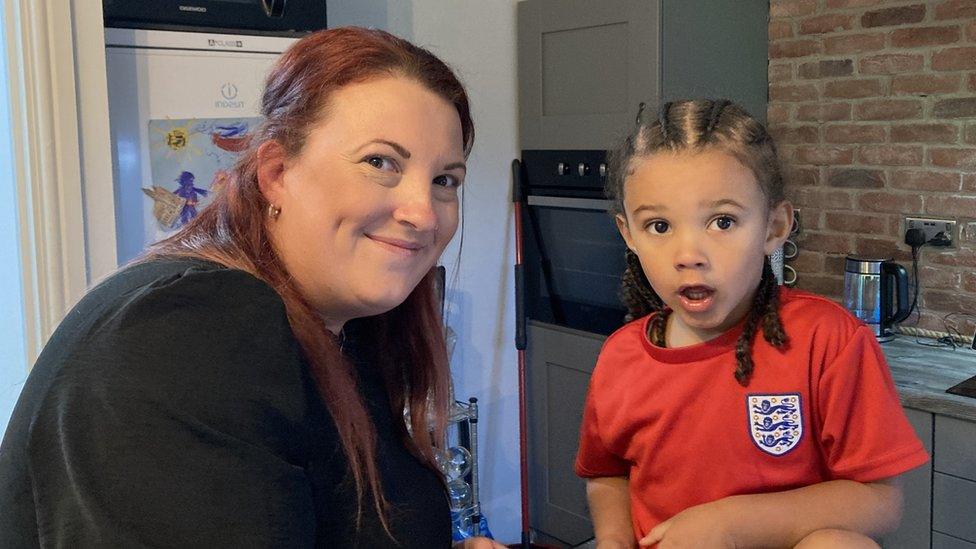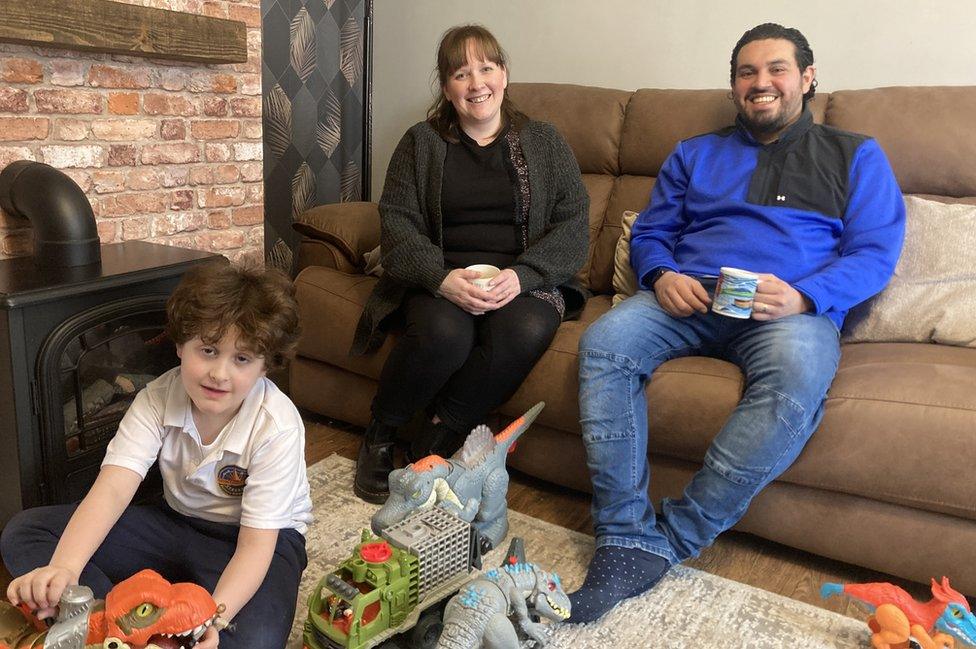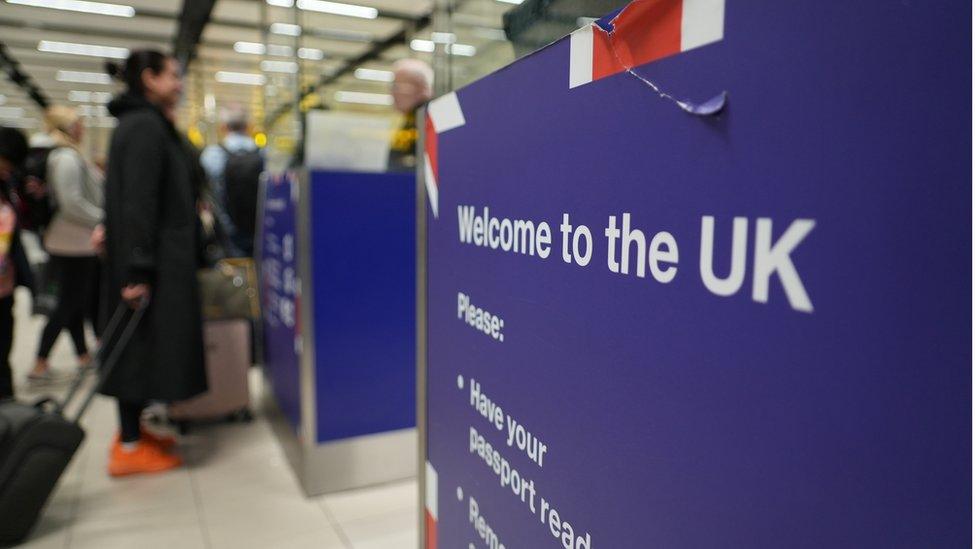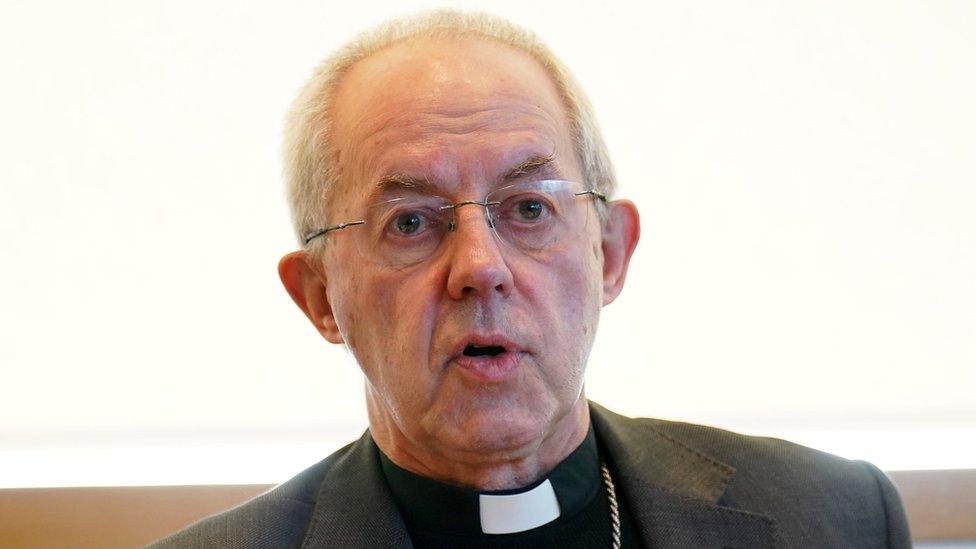County Durham mum says new family visa rules 'devastating'
- Published

Lindsay Thompson fears her son Arland could be badly affected by being separated from his father
A mother says a "devastating" tightening of visa rules will prevent her Jamaican husband joining her and their three-year-old son in the North East.
From Thursday, the salary needed to bring family members to the UK will rise from £18,600 to £29,000.
Lindsay Thompson, of County Durham, said she had been left "angry".
The government said the move would reduce immigration and ensure families were not a burden on taxpayers.
A further increase to £34,000 is planned later this year with another rise, to £38,700, due in early 2025.
Separation fear
Mrs Thompson, from South Hetton, met her husband Orlando while holidaying in his home country.
Now, despite her full-time job with a travel firm, she was worried they would be permanently separated as her job paid below the incoming visa threshold of £29,000.
She was also concerned about the potential impact on their son Arland.
"I haven't got him there to support us," she said of her husband.
"I feel like a single-parent but I am not a single-parent because my son has got a father. He's just not in this country."
Asked how it felt for her husband, she said: "Absolutely devastating - he's had a relationship with his son for nearly four years by FaceTime."

Mrs Thompson, pictured with her husband and their son, said her full-time job paid below the incoming visa threshold of £29,000
Hayley Cartagena, from South Shields, South Tyneside, said she spent years trying to qualify for a spouse visa for her husband Elvin, who is from Honduras, and they believed the system was unfair.
Mr Cartagena was finally granted a visa in 2023 but the family said the time they spent apart deeply affected their son, Benjamin.
"What they are telling us is that we can't fall in love with somebody who is not British because we don't earn enough and that's wrong," Mrs Cartagena said.
She pointed out her husband now has a job at the Nissan car plant, in Washington, and said she was angered by any suggestion new arrivals would be a burden.
"We are not coming here to sponge off the system or to be a burden to the taxpayer. We are coming here to be a family," she added.

Hayley and Elvin Cartagena worry about the impact their separation had on their son Benjamin
The measures were announced by the government in December after official figures showed net migration reached a record high of 745,000 in 2022.
The threshold had initially been due to rise to £38,700 this month but the Home Office decided to implement the increase in stages following criticism.
'Tool kit'
More than 70,000 people across the country have signed a petition calling for the government to scrap the moves, but a Home Office spokesperson said "decisive action has been taken to deliver the largest cut to net migration ever".
"We have a long-standing principle that anyone bringing dependants to live in the UK must be able to financially support them," they added.
"The Minimum Income Requirement ensures that families are self-sufficient."
Conservative MP Peter Gibson, who represents Darlington, defended the policy as he warned immigration was putting pressure on housing and public services.
"In order to tackle that and bring those immigration figures down, this is one of the tools in the tool kit," he said.
Analysis by the Migration Observatory at the University of Oxford suggested fewer than half of north-east workers earned £29,000.
One of the researchers from the organisation, Nuni Vieira Jorgensen, said: "The new family income requirement doesn't take into account the fact that salaries vary a lot depending on where people live in the UK.
"For example, we estimate that in north-east England, where wages tend be lower, about 80% of people in full-time jobs will not earn enough to bring a foreign spouse to the country once the new policy comes into full effect in early 2025.
"This compares with 70% of employees living in other parts of the UK."

Follow BBC North East on Facebook, external, X (formerly Twitter), , externaland Instagram, external. Send your story ideas to northeastandcumbria@bbc.co.uk, external.
Related topics
- Published22 December 2023

- Published14 December 2023

- Published8 December 2023
